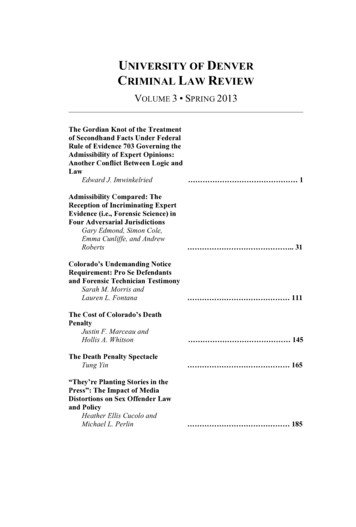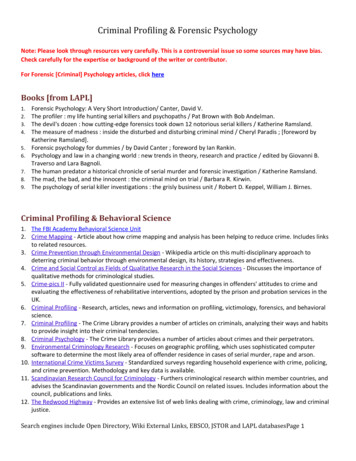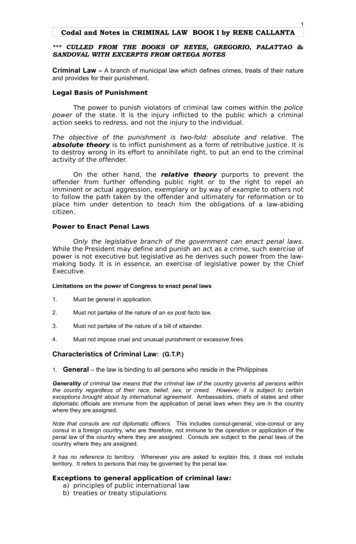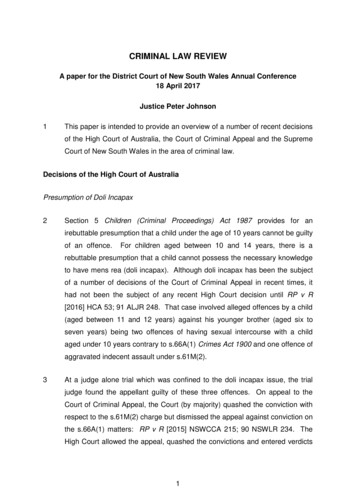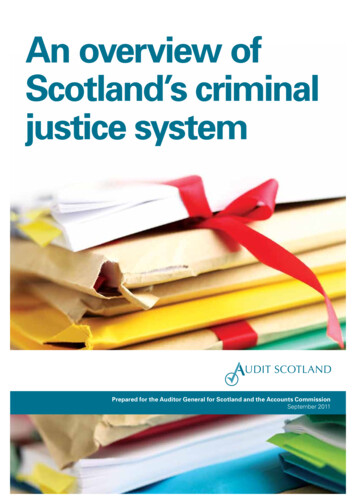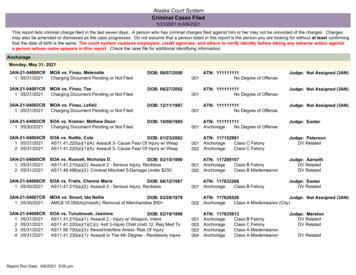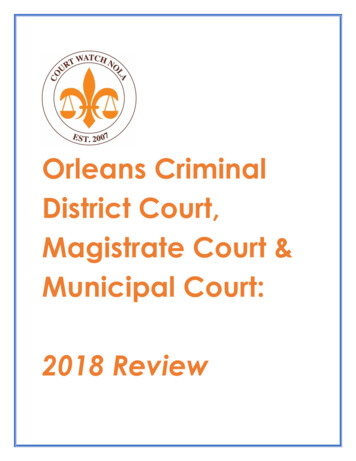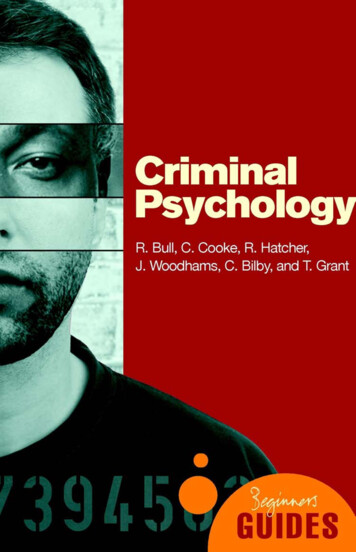
Transcription
prelims.08124/08/200611:43 AMPage icriminal psychologya beginner’s guide
prelims.08124/08/200611:43 AMPage iiFrom anarchism to artificial intelligence and genetics to global terrorism,Beginner’s Guides equip readers with the tools to fully understand themost challenging and important debates of our age. Written by experts ina clear and accessible style, books in this series are substantial enough tobe thorough but compact enough to be read by anyone wanting to knowmore about the world they live in.anarchismdemocracyruth kinnadavid beethamthe n cohn-sherbok &dawoud el-alamisimon tormeyvaclav smilphilosophy of mindartificial intelligenceblay whitbyevolutionedward feserburton s. guttmanpostmodernismevolutionary psychologykevin hartjohn spicerrobin dunbar, louisebarrett & john lycettquantum physicsbioterror & biowarfaregeneticsbiodiversityalastair i. m. raemalcolm dandoa. griffiths, b. guttman,d. suzuki & t. cullisreligionmartin forwardthe braina. al-chalabi, m.r. turner global terrorism& r.s. delamontleonard weinbergcriminal psychologyNATOray bull et al.jennifer medcalfthe small arms tradem. schroeder, r. stohl &d.m. smithForthcoming:astrobiologyfair trademafialewis dartnelljacqueline decarlojames finckenauerasylumforensic scienceracismpamela goldbergjay siegelalana lentincapitalismgalaxiesradical philosophyandrew kilmister, garybrowningjoanne bakerandrew collierhuman rightstimecloningdavid beethamamarendra swarupaaron levineimmigrationvolcanoesconspiracy theoriesliza schusterrosaly lopesalasdair sparkthe irish conflictextrasolar planetsian stevensanthony mcintyre,david adams
prelims.08124/08/200611:43 AMPage iiicriminal psychologya beginner’s guideray bull, claire cooke,ruth hatcher, jessica woodhams,charlotte bilby and tim grant
prelims.08124/08/200611:43 AMPage ivcriminal psychology: a beginner’s guideA Oneworld BookPublished by Oneworld Publications 2006Copyright R H Bull, Charlotte Bilby,Claire Cooke, Tim Grant, Ruth Hatcher,Jessica Woodhams, 2006All rights reservedCopyright under Berne ConventionACIP record for this title is availablefrom the British LibraryISBN-13: 978–1–85168–477–9ISBN-10: 1–85168–477–8Typeset by Jayvee, Trivandrum, IndiaCover design by Two AssociatesPrinted and bound in Great Britainby Biddles Ltd., Kings LynnOneworld Publications185 Banbury RoadOxford OX2 7AREnglandwww.oneworld-publications.comNL08Learn more about Oneworld. Join our mailing list tofind out about our latest titles and special offers at:www.oneworld-publications.com/newsletter.htm
prelims.08124/08/200611:43 AMPage vcontentsprefaceoneviicriminal psychologists: within whichsettings do they work?1twooffender profiling and linking crimethreepolicingfourinterviewing suspectsfivedetecting deceptionsixeye-witness testimonysevenforensic linguisticseightpunishment and offendersnineexperiencing imprisonmenttenrehabilitation of offenders: what works?eleventhe management and treatment of36sex offendersindex17189168536887102116132150
prelims.08124/08/200611:43 AMPage vi
prelims.08124/08/200611:43 AMPage viiprefaceCriminal psychology covers a range of fascinating topics. Forcenturies people have been very interested in crime, and in the lasthundred years psychology has grown from a fledgling discipline toone of great importance. In several countries around the world(e.g. the USA, the UK), psychology is now among the top threemost popular subjects to be studied at university or college.It is now recognized that psychology is highly relevant to manyaspects of life, especially those to do with offenders, prisons,the police, witnesses, and the courts. This book has been writtenfor members of the general public who wish to have a betterunderstanding of criminal psychology than that which can beprovided by the popular media such as newspapers and television.In this book we have explained in a reader-friendly way theresearch (and theory) which underpins modern criminal psychology. Thus the book will also be of interest to those commencingtheir studies of criminal psychology (e.g. in college or the finalyears of school).We authors of the book have used everyday language to explainthe many facets of criminal psychology. We have described thecomplexity of the issues and explained why, therefore, there arerarely simple answers or rules regarding criminal psychology (e.g.why harsh punishment may not reduce offending, that liars maynot look away when deceiving you, that coercion may not producereliable confessions).vii
prelims.08124/08/200611:43 AMPage viiiviii prefaceThe contents of this book would not have been possible without the help of all those people around the world who have participated in the thousands of relevant psychological studies. Wewould like to thank the police officers, witnesses, victims, offenders, prison officers and others who have given up their time, oftenin very difficult circumstances, to make a contribution. We wouldalso like to thank Julie Blackwell-Young for her assistance withchapter eight and Aimee Jones for, among other things, collatingthe chapters.Ray BullLeicester January 2006
ch1.08124/08/200611:28 AMPage 1chapter onecriminal psychologists:within which settingsdo they work?introductionIf you were asked the question ‘What do criminal psychologistsdo in their everyday working life?’, what would you answer? Ifyou were to believe the latest television dramas you might thinkthat the main role of criminal psychologists involves helping thepolice to catch criminals or engaging in the ‘profiling’ of offenders. If, however, you had watched films such as The Silence ofthe Lambs, then you might believe that all criminal psychologists,like Clarice Starling, attempt to gain a better insight into theminds of serious offenders by talking to convicted offenders abouttheir crimes.These popular conceptions of the work of criminal psychologists, while they may be true for a small number, do not representthe wide variety of roles that those trained in criminal psychologycan, and do, work. From assisting the police in investigations, providing advice on interviewing of suspects or witnesses, working asexpert witnesses in court cases, working in the rehabilitation ofoffenders, conducting criminal psychology research or working inacademia, the work of criminal psychologists is varied and widereaching.1
ch1.08124/08/2006211:28 AMPage 2criminal psychology: a beginner’s guideThis chapter aims to present a balanced view of the professionof criminal psychology and to introduce the reader to the varietyof roles within which criminal psychologists can, and do, work. Itwill guide you through the criminal justice process and provide abrief overview of how criminal psychologists may contribute theirexpertise at each stage. Further and more in-depth informationcan be found in the following chapters.what is criminal/forensic psychology?The term ‘criminal psychology’ has been defined in a number ofdifferent ways. Even today there is no accepted definition. Forexample, ten years ago two leading criminal psychologists in theUK defined it as ‘that branch of applied psychology which is concerned with the collection, examination and presentation of evidence for judicial purposes’ (Gudjonsson and Haward 1998, p. 1).It would seem from this explanation that criminal psychology isconcerned with investigative (those to do with the police) andcourt processes. However, with the growth in the last quarter of acentury in the involvement of criminal psychologists in the assessment and treatment of offenders following their sentencing, itwould not be surprising if there were some disagreement with adefinition which would exclude these groups of professionalsfrom being called criminal psychologists.It would seem therefore that a wider definition of the termis needed. A leading American psychologist has gone some wayto provide this. He described criminal psychology as ‘any application of psychological knowledge or methods to a task faced bythe legal system’ (Wrightsman 2001, p. 2). This more inclusivedefinition involves the whole of the legal system. As you will seein the coming pages, criminal psychologists can be involved inall areas of the judicial process (including post sentence) anda broad-based definition is needed to encompass all of thiswork.In 1981 Professor Lionel Haward, one of the UK’s foundingfathers of criminal psychology, described the four roles that
ch1.08124/08/200611:28 AMPage 3criminal psychologists3psychologists may perform when they become professionallyinvolved in criminal proceedings. These are:1. Clinical: in this situation the psychologist will usually beinvolved in the assessment of an individual in order to providea clinical judgement. The psychologist could use interviews,assessment tools or psychometric tests (i.e. special questionnaires) to aid in his or her assessment. These assessments caninform the police, the courts, or the prison and probation services about the psychological functioning of an individual andcan therefore influence how the different sections of the criminal justice system process the individual in question. Forexample, a psychologist may be asked to assess individuals inorder to determine whether they are fit to stand trial orwhether they have a mental illness which means that theywould not understand the proceedings.2. Experimental: this can involve the psychologist performingresearch in order to inform a case. This can involve carryingout experimental tests in order to illustrate a point or providefurther information to the courts (for example, how likely it isthat someone can correctly identify an object in the hand of anindividual from a distance of 100 metres at twilight).Alternatively, it can involve psychologists providing the courtwith a summary of current research findings which may berelevant to the case in question.3. Actuarial: in this instance the word ‘actuarial’ relates to theuse of statistics in order to inform a case. One example ofhow a psychologist may act in an actuarial role is if they arerequired to present actuarial information relating to theprobability of an event occurring to the court. For example, acourt may wish to know how likely an offender is to reoffendbefore the sentence is decided. In such a case, a psychologistcould be called upon in order to inform the pre-sentencereport to the court.4. Advisory: in this role the psychologist may provide advice tothe police about how to proceed with an investigation. Forexample, an offender’s profile could inform the investigation, or
ch1.08124/08/2006411:28 AMPage 4criminal psychology: a beginner’s guideadvice could be provided about how best to interview aparticular suspect. Alternatively, a prosecution or defencelawyer may ask for advice on how best to cross-examine a vulnerable witness or another expert witness. This role involvesthe use of the psychologist’s expertise in order to advise thepolice, courts or prison and probation services.As you can see, psychologists can be used in a variety ofdifferent scenarios within the criminal justice system and for anumber of different reasons. The next few sections will examine inmore detail how psychologists can and do contribute theirexpertise to aid the work of the criminal justice system. This list ofroles, however, does not claim to be exhaustive – there aremany more ways in which psychologists play their part. Wehave therefore chosen the most well-known roles in order togive an indication of what working in criminal psychologycan involve.criminal investigationsThe role of a psychologist in criminal investigations can take avariety of forms. Professor Laurence Alison of the University ofLiverpool has suggested a number of ways in which the expertiseof a psychologist could aid the police and support the work thatthey do.It is important to appreciate that the ways in which psychologistscan contribute extends well beyond the process of profilingoffenders. Indeed the apprehension of the offender would beassisted by enhancing police decision-making and leadershipskills, improving methods of interviewing witnesses and victims,developing accurate methods of recording, collating andanalysing data on preconvictions of offenders, developing suspect prioritization systems based on empirical research andenhancing intelligence-led policing and the use of informants.(Alison 2005)
ch1.08124/08/200611:28 AMPage 5criminal psychologists5From the list contained within this quote, it can be seen thatthe role of the psychologist in assisting the police can bewide-ranging. The next sections will focus on some of these rolesin more detail.crime analysisCrime analysis (sometimes also called intelligence analysis) isone field of work which draws upon criminal psychologicalmethods. Crime analysts are generally employed by the police(or policing agencies, for example in the UK the NationalCrime and Operations Faculty and the National Crime Squad)in order to analyse crime data to aid the police carry out theirroles.One of the most common roles of crime analysts is that of caselinkage. This process involves the linkage of crimes based on thesimilarities in the behaviours of the offender as reported bythe victim or as inferred from the crime scene. For example, letus examine a rape case committed by a stranger on a womanwalking home alone after a night out with her friends. Crimeanalysts could use the details of this case – the fact that she hadjust left a nightclub, that the rapist took some of her clothingaway from the scene with him, and the content of the threatsused towards the woman – in order to check against an alreadyestablished database of similar crimes to see whether there areany similarities to past crimes. If matches are found – the samethreats were used, similar items of clothing taken by a rapist, andit was in a close geographical location to another rape – then thisinformation can be used by the police to invest
Criminal psychology covers a range of fascinating topics. For centuries people have been very interested in crime, and in the last hundred years psychology has grown from a fledgling discipline to one of great importance. In several countries around the world (e.g. the USA, the UK), psychology is now among the top three most popular subjects to be studied at university or college. It is now .

